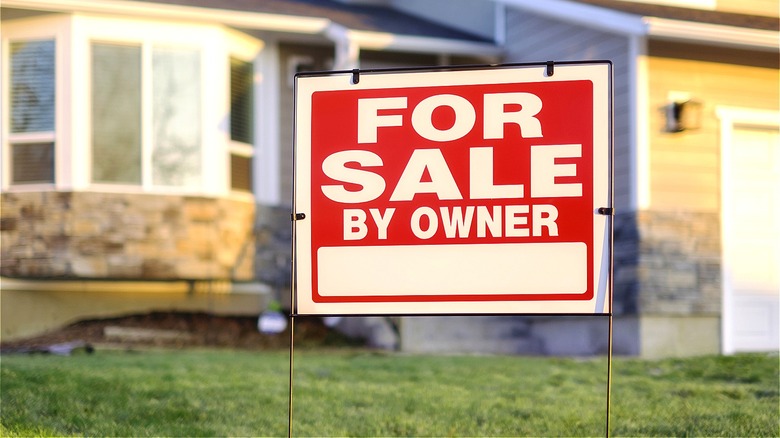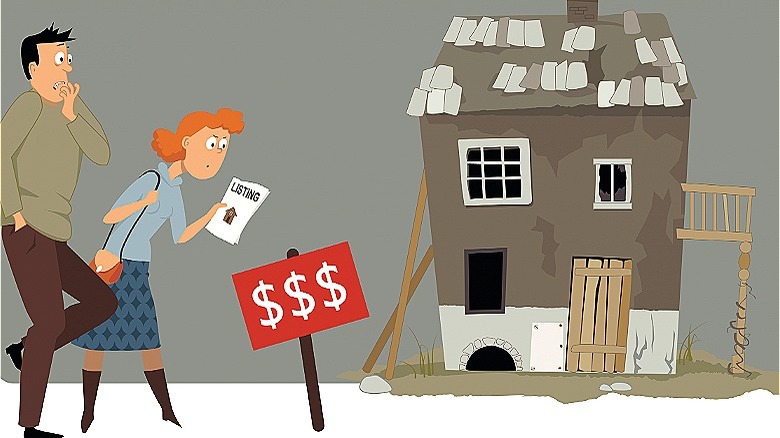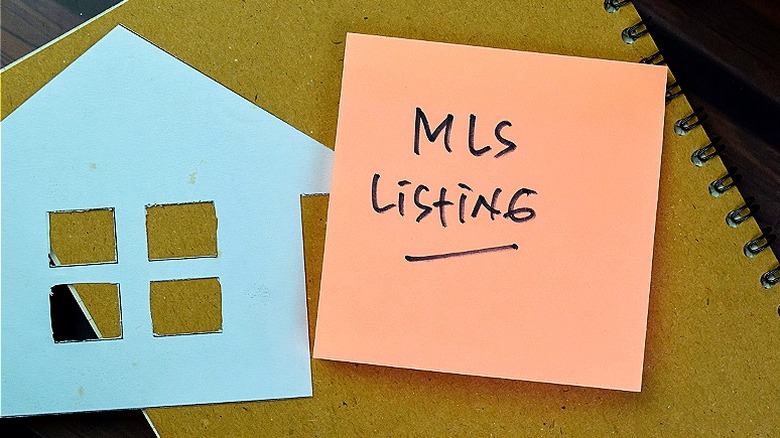Why Selling Your House On Your Own Could End Up Costing You
When listing a home for sale with a licensed real estate agent, a typical sales commission is 5% to 6% of the home's selling price. That commission — which is paid entirely by the seller, not the buyer — is typically split between the seller's agent, called the listing agent, and the agent representing the buyers, appropriately called the buyer's agent. Each of the two agents involved in the transaction receives approximately 2.5% to 3% of the home's final sales price.
During the COVID-19 pandemic era, the median price of an existing home in the United States rose from about $321,000 in 2019 to more than $457,000 in 2022, according to Statista. That means that a 6% commission on a median-priced home would be a whopping $27,000. In some states, the median price of an existing home can be far higher than the national average as well. For example, the 2022 median price in California is approximately $834,000 — a commission of more than $50,000.
Understandably, it can be tempting for home sellers to want to save on paying out hefty real estate commissions by trying to sell their properties themselves, but is that a good strategy? In many cases, it isn't. Selling a home without professional assistance can be rife with pitfalls, especially for sellers without much real estate experience. In the end, it can actually cost you more than the commission you're saving.
Setting the price too low
Selling your home yourself is known in the real estate industry as For Sale By Owner, frequently shortened to "FSBO." In 2022, FSBOs represented 7% of all home sales, according to the National Association of Realtors. Further, 57% of FSBO sellers knew the person who purchased their homes. Completing a successful FSBO to a stranger is a daunting process, especially one of the very first steps: setting the asking price.
A classic mistake in by-owner listings is a seller who sets the price of their property too low, which leaves potential equity (and profit) on the table. While some experienced real estate professionals might rationalize that underpricing a home isn't a huge misstep because doing so will typically result in multiple offers and a bidding war for the underpriced property, this may not apply to an FSBO.
The high level of traffic to a well-advertised great deal will result in an eventual selling price at or above market levels. However, homes that are being sold by owners may not have the same amount of marketing and exposure to potential buyers that brokered properties enjoy. That could result in an underpriced FSBO remaining hidden until a lucky buyer comes along and snaps the home up for a bargain-basement price, potentially leaving the seller with less net proceeds than if they had paid a sales commission to obtain professional pricing advice to begin with.
Asking for too much
Yet, equally hazardous as asking too little for your home is asking too much. Homeowners have a tendency to assume that their property is the nicest on the block or has extra valuable features that, in reality, might be quite personal and not desirable to every buyer. Simultaneously, homeowners can fail to identify or factor in shortcomings or flaws that they've grown accustomed to.
There's also the tendency to ask x% more than the last property sold in the neighborhood, just to "test" the market. While this assumption might not be totally wrong, real estate agents have a much better snapshot of the local market at any given time and can assist sellers with setting a price that, while still premium, is at least somewhat realistic with how much similar comparable properties ("comps") have recently sold for.
Considerably overpriced homes won't receive much attention from potential buyers. Some house hunters might also be hesitant to make a significantly lower offer that's near market value for fear of upsetting or offending the seller. Finally, savvy buyers will recognize that FSBO sellers are saving a large sum of money by not paying a commission. That could lead to expectations of a discount for the buyer, essentially "splitting" the savings of not involving a professional.
Not getting help with contracts or other legal documents
Needless to say, selling a home comes with a plethora of legal documents. While a local attorney or title company can handle many aspects of the transaction for a home seller, there are other tasks that typically fall with the real estate agent. Those items will now be the responsibility of the owner who chooses to sell without assistance.
In the past, sellers were allowed to remain silent regarding known issues with a property's physical condition unless the buyer specifically asked. Nowadays, some states are requiring sellers to disclose certain condition issues or else face costs and fees associated with repair of the undisclosed issues. Additional responsibilities vary by locale, but typically include disclosures for the presence of lead-based paint, radon gases coming from the ground, the source of potable (drinking) water, and other factors.
Further, once a home does receive an offer, a real estate agent can provide valuable insight on accepting, declining, or negotiating that offer. An agent's negotiating skills are likely to be sharp from experience and frequent use, which isn't always true for homeowners.
A real estate agent also typically draws up a legally binding purchase contract. The terms of that contract will include the amount and conditions of the escrow (aka "good faith") deposit, inspection periods, time frame for closing the transaction, contingencies such as the buyer getting approved for financing, etc. An amateur contract may lack some of these important considerations, leaving the terms of sale open to legal debate.
Limiting your promotion and marketing
When you list a property with a licensed real estate agent, they're going to market the property in all of the ways you might expect. That promotional campaign will likely include social media, emails to clients, creating flyers, and holding one or more open houses. However, the biggest weapon in a real estate agent's arsenal is access to the MLS, or multiple listing service. The National Association of Realtors defines MLS as "... private databases that are created, maintained and paid for by real estate professionals to help their clients buy and sell property." Frequently, MLS databases are divided by city, county, or region.
The public also has access to a version of the MLS, either directly or through websites like Zillow and Realtor.com. When a home is input into the MLS system, it's automatically shared with several, even dozens, of consumer-facing websites. Not having your property listed in the MLS can put that home sale at a serious disadvantage, and only licensed real estate professionals have permission to create listings in the database.
Besides the portion of a home listing that's visible to everyone, agents also have access to a more complete set of data, including showing instructions, confidential notes, as well as the listing agent's contact information. If your property isn't listed, then real estate professionals or potential buyers may not even be aware that it's for sale.
Working with a smaller pool of buyers
If a real estate agent does happen upon an FSBO listing in person or on a site, such as Facebook Marketplace, they'll be unlikely to show it to their buyer clients because there's no sales commission involved. Buyer's agents need to be paid for their time and if by-owner sellers aren't offering any compensation to buyer's agents, why would they waste time and effort showing that property?
Additionally, buyers who are already working with an agent but locate an FSBO property on their own may be advised against getting involved in a by-owner transaction, and for some, this may be understandably so. Some agents may have had prior bad experiences with unknowledgeable FSBO sellers, e.g., the seller might have unrealistic expectations of price and other terms necessary for a successful deal. Such obstacles can ultimately result in a smaller pool of buyers for your FSBO.
One final word of advice to would-be home sellers is that it's possible to list your home yourself, save on the listing agent's portion of the commission, but pay a 2.5% to 3% fee to incentivize buyer's agents to show your property to prospective buyers. In that scenario, sellers would pay approximately half the typical rate of dealing with a full-service listing agent. While that's a good compromise, it doesn't remove the dangers of selling a home on your own, like publicity and pricing concerns.





